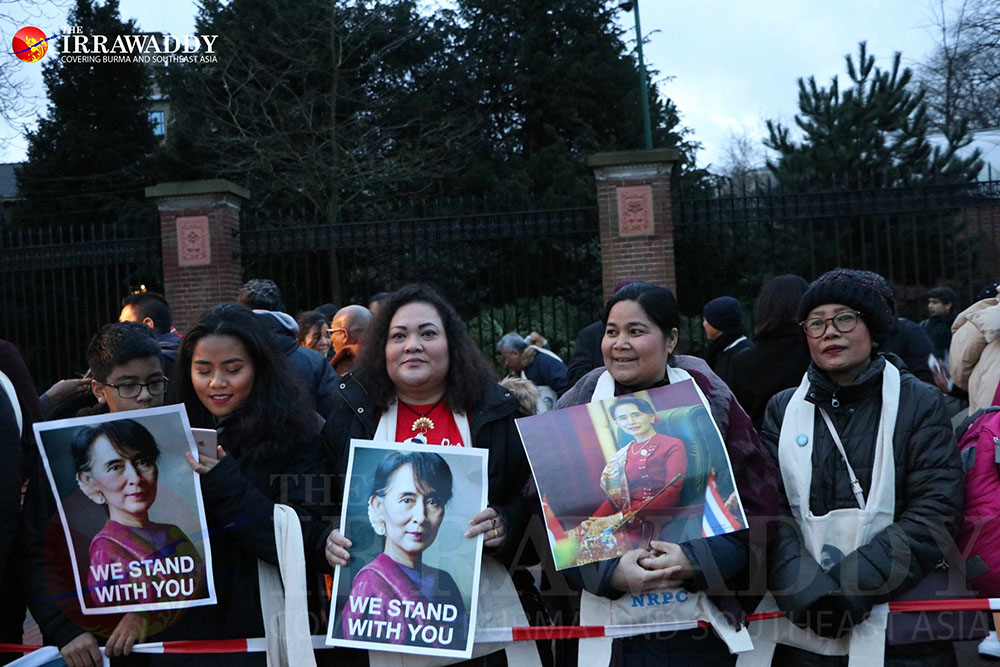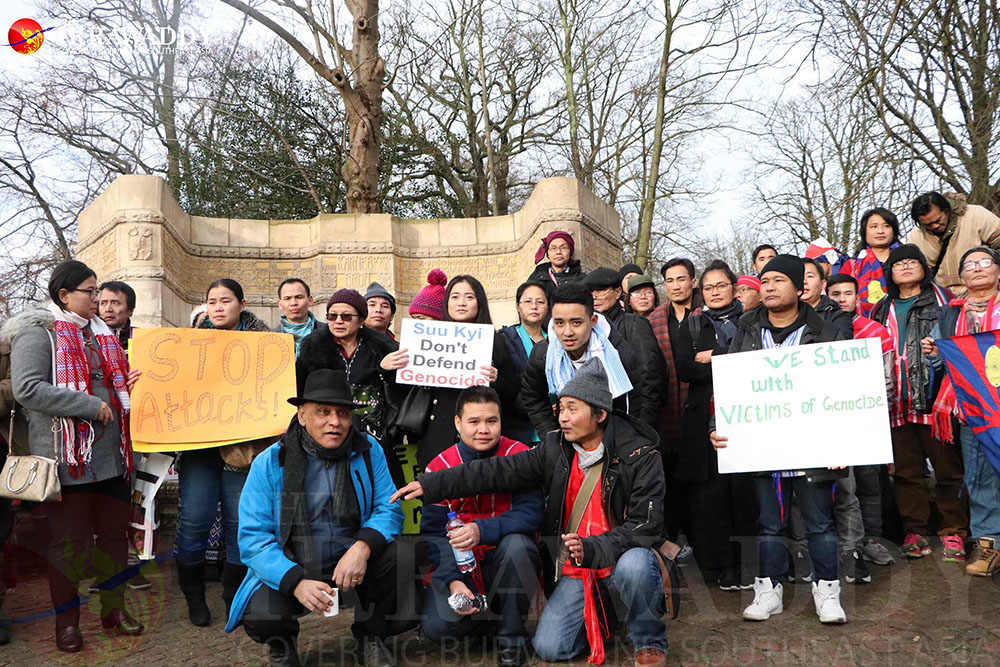THE HAGUE, Netherlands—Myanmar State Counselor Daw Aung San Suu Kyi on Wednesday told the International Court of Justice (ICJ) that no genocide was committed in Myanmar, as defined in international law, and described the Rohingya issue as an “internal conflict”.
Daw Aung San Suu Kyi delivered the opening remarks as Myanmar presented its first oral arguments at the World Court on Wednesday, a day after The Gambia’s team addressed the judges.
The African nation filed a lawsuit at the court in November on behalf of the Organization of Islamic Cooperation, accusing Myanmar of committing genocide against the Rohingya.
In a nearly 25-minute speech summarizing the historical context of the Rohingya crisis in an effort to demonstrate the complexity of the issue, the State Counselor accused The Gambia of placing before the court an “incomplete and misleading factual picture of the situation in Rakhine State”. She said, “We pray the court to refrain from taking any action that might aggravate the ongoing armed conflict, peace and security in Myanmar”, referring to fighting between the Arakan Army and the military.
More than 700,000 Rohingya fled Myanmar to neighboring Bangladesh in late 2017 after the government’s security forces launched clearance operations in northern Rakhine State in response to a series of attacks by the Arakan Rohingya Salvation Army on police outposts in the area. UN investigators said the operations had “genocidal intent”. Both the Myanmar government and military have denied the accusations.

On Wednesday, Daw Aung San Suu Kyi said the applicant had brought a case based on the Genocide Convention. She said Myanmar is dealing with an internal armed conflict that started with coordinated and comprehensive attacks by the Arakan Rohingya Salvation Army (ARSA), to which Myanmar’s defense services responded, leading to “the exodus of several hundred thousand Muslims from the three northernmost townships of Rakhine into Bangladesh.”
“Please bear in mind this complex situation and the challenge to sovereignty and security in our country when you’re assessing the intent of those who attempted to deal with the rebellion. Under the circumstances, genocidal intent cannot be the only hypothesis.”
She also insisted that if war crimes have been committed by Myanmar military members, they will be prosecuted through the Myanmar military justice system, saying that international law only gives international courts power to intervene when a country fails to prosecute crimes itself.
Currently, Myanmar’s Independent Commission of Enquiry is finalizing the report on its Rakhine investigation and the Myanmar military is holding a court martial for some of its members who failed to adhere to its rules of engagement.
“No stone should be unturned to make domestic accountability work. It would not be helpful for the international legal order if the impression takes hold that only resource-rich countries can conduct adequate domestic investigations and prosecutions.”

However, she acknowledged that the military’s pardoning of the perpetrators of the killings of 10 Muslim men in Inn Din village was not right.
“After serving a part of their sentences, they were given a military pardon. Many of us in Myanmar were unhappy with the pardon.”
On Wednesday, as Daw Aung San Suu Kyi was making her remarks before the court, a few hundred of her supporters gathered outside the court to offer her moral support. They shouted “Long Live Mother Suu” while holding placards with slogans including “We Stand with Daw Aung San Suu Kyi.”
At the same time, a few meters away, a group of Rohingya and members of ethnic groups including Karen, Shan and Rakhine showed their support for the trial. They thanked The Gambia for its initiative against Myanmar while condemning Daw Aung San Su Kyi and called for action to be taken against the Myanmar military for its repression against them.
The State Counselor’s denial of genocide prompted mixed reactions from human rights organizations and others.
Amnesty International said she tried to downplay the severity of the crimes committed against the Rohingya population.
“The suggestion that Myanmar authorities can currently and independently investigate and prosecute those suspected of crimes under international law is nothing but a fantasy, in particular in the case of senior military perpetrators who have enjoyed decades of total impunity,” said Nicholas Bequelin, the AI regional director.
Prominent Myanmar lawyer U Thein Than Oo said the message Daw Aung San Suu Kyi sent Wednesday is that she will not tolerate any acts of inhumanity, and that anyone who breaks the law will be punished.
The problem is that the practice of justice and the rule of law in Myanmar are still poor, the lawyer said, adding that the process of punishing those who are guilty is too slow. The military also has rules and laws, he said, but they are seldom practiced, and it is necessary to push forward to achieve justice.
He said Myanmar should not deny what happened and what is happening in the country, because there is a lot of evidence of brutal acts by the military.
“There are many locals suffering—not only the Rohingyas in Rakhine State, but also many other locals in that area and the locals of Kachin and Shan states are in a state of misery,” he said.
On the other hand, the lawyer said, she does not care about how the international community treats her. He said that for her, facing the ICJ is partly political. She is now winning the hearts of her supporters and she and her party will win in the upcoming election. Meanwhile, the image of the military and its supporters has suffered because they have not faced the ICJ as she has done. It is a win-win situation for her, domestically, the lawyer said.
Following Daw Aung San Suu Kyi’s remarks at the ICJ, George Graham, director of conflict and humanitarian advocacy at Save the Children, said, “Aung San Suu Kyi’s remarks fly in the face of all the evidence gathered by the UN, and the testimony our own teams have heard from countless survivors. Rohingya families have faced unimaginable horrors. Children and their parents have been systematically killed, maimed and raped. Yet the government of Myanmar has failed to punish those responsible. The world can no longer accept Myanmar’s tactics of delay and diversion. Justice delayed is justice denied.”
You may also like these stories:
Myanmar Supporters Travel From Near and Far to Show Solidarity With State Counselor in The Hague
A Black Swan for Nobel Peace Laureate Daw Aung San Suu Kyi
Clashes Over Charter Change Grow Fiercer Than Ever in Myanmar Parliament
Rohingya Insurgent Chief Praises Gambia’s Genocide Charges Against Myanmar

















